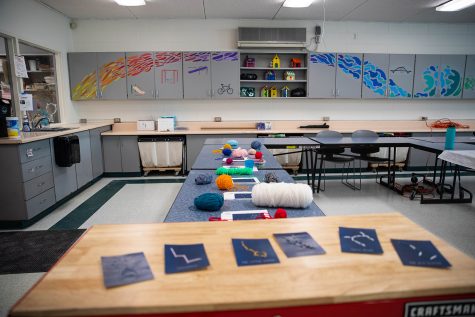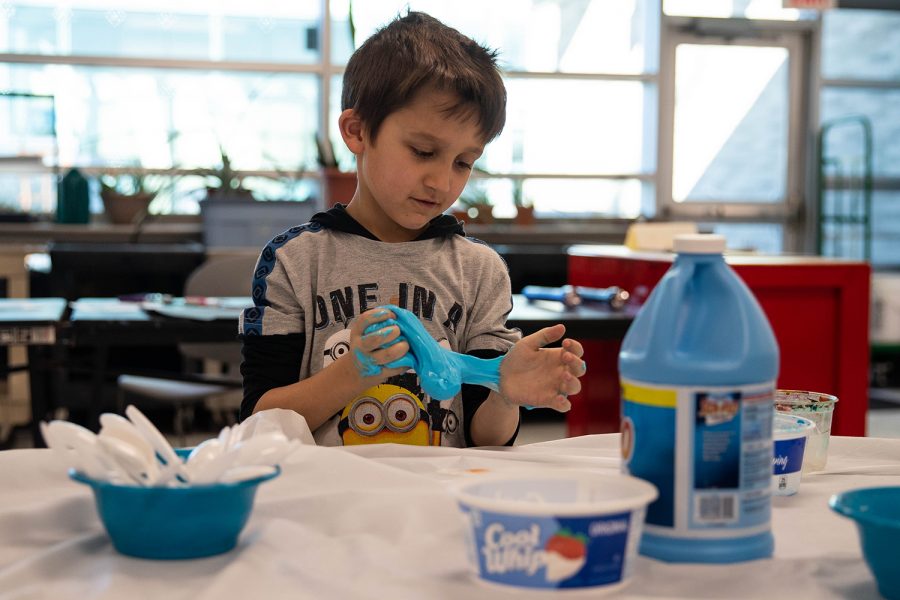Iowa City community benefits from interactive art and science program
In an effort to give children the opportunity to explore their creativity with hands-on scientific experiments, the Robert A. Lee Community Recreation Center has launched its new “Maker Space,” an interactive program for families in the community to benefit from.
Alex Butler, 7, plays with putty in the Makers Space at the Robert A. Recreation Center on Thursday, Feb. 6, 2020.
February 9, 2020
The Robert A. Lee Community Recreation Center recently launched its new “Maker Space,” a three-month interactive program where K-12 students experience the collaboration of art and science hands-on without the pressure of a traditional school environment.
The center’s Coordinator of Special Events Erica Dodge said the space was special because it allows kids to explore while they are learning. Kids can participate in activities ranging from learning about explosions to examining Iowa State University’s insect zoo.
The programming will run from 2-4 p.m. Thursdays and Saturdays for three months between Jan. 25 and April 25.
“It’s a free space where kids can explore through doing,” Dodge said. “I believe this is a big shift in the education world, where there are rigid structures and set principles, and that can strangle a child’s ability to create.”
Dodge said the space promotes STEAM: Science, Technology, Engineering, Art and Mathematics. The STEAM concept differs from the more commonly known STEM learning, she said, because it adds an art component to the lessons and allows for students to go beyond the given expectations and expand their creativity.
“Art comes through in everything we do,” Dodge said. “The Maker Space allows children to embrace creativity from all kinds of angles. A lot of childhood is exploring, testing, and experimenting. That’s how we learn, and in a way, that is science.”
The space holds free events every Tuesday and Saturday, “Open Maker Space” time, where children come and take advantage of the hands-on experiments and kits the space provides, she added.
RELATED: UI professor brings art and science together in new exhibit
The coordinators of the Maker Space plan to keep the programming free and rely financially on awards and donations from multiple organizations and companies instead. The organization would consider shifting its funding sources in order to cover basic costs, but as of now, there is no plan to do so, said Nature and Science Coordinator Nancey Pope wrote in an email to The Daily Iowan.
The Maker Space also has special “STEAM Saturdays” on the third or fourth Saturday of every month, where the space will bring in shows or individuals from other science organizations or centers, and members of the community can participate. The space will run up until the Earth Fest on April 25, ending the space’s season, Dodge said.
The overall goal of the Maker Space is to create an open and inviting environment that can support a wide range of ages and abilities, Pope said.
“We are giving families the opportunity to gather, share ideas, make new friends, and develop new hobbies,” she said.

Arts and crafts supplies are seen in the Makers Space at the Robert A. Recreation Center on Thursday, Feb. 6, 2020.
Parents can also benefit from the space either by participating in the activities or finishing up work they need to do while their child is busy exploring, Dodge said.
City of Iowa City Special Projects Assistant and parent Jack Brooks said that he enjoys the space because it brings the community together, and he can strike up a conversation with other parents while his daughter conducts science experiments.
“It’s nice to have a free program that can get you and your child out into the community where they are doing something that feels like play, but is also a science experiment,” Brooks said.
Brooks said he also likes the flexibility that the Maker Space provides.
“The space allows a lot of freedom, and kids can learn on their own and at their own pace,” he said.
The concept of gathering and trying something out of the ordinary is the very essence of the Maker Space. Dodge emphasized that not every child has to complete their activities the same way, which she said is one unique aspect of the space.
“You can use other realms to understand science,” she said. “It doesn’t have to be 100 percent technical all the time. It’s trying to connect kids who really like art and using their creative side and show them, ‘Oh, I can do science, too.’ It is art, it is creative.”



